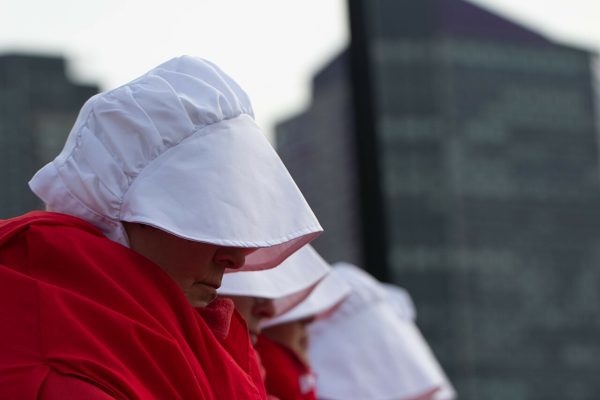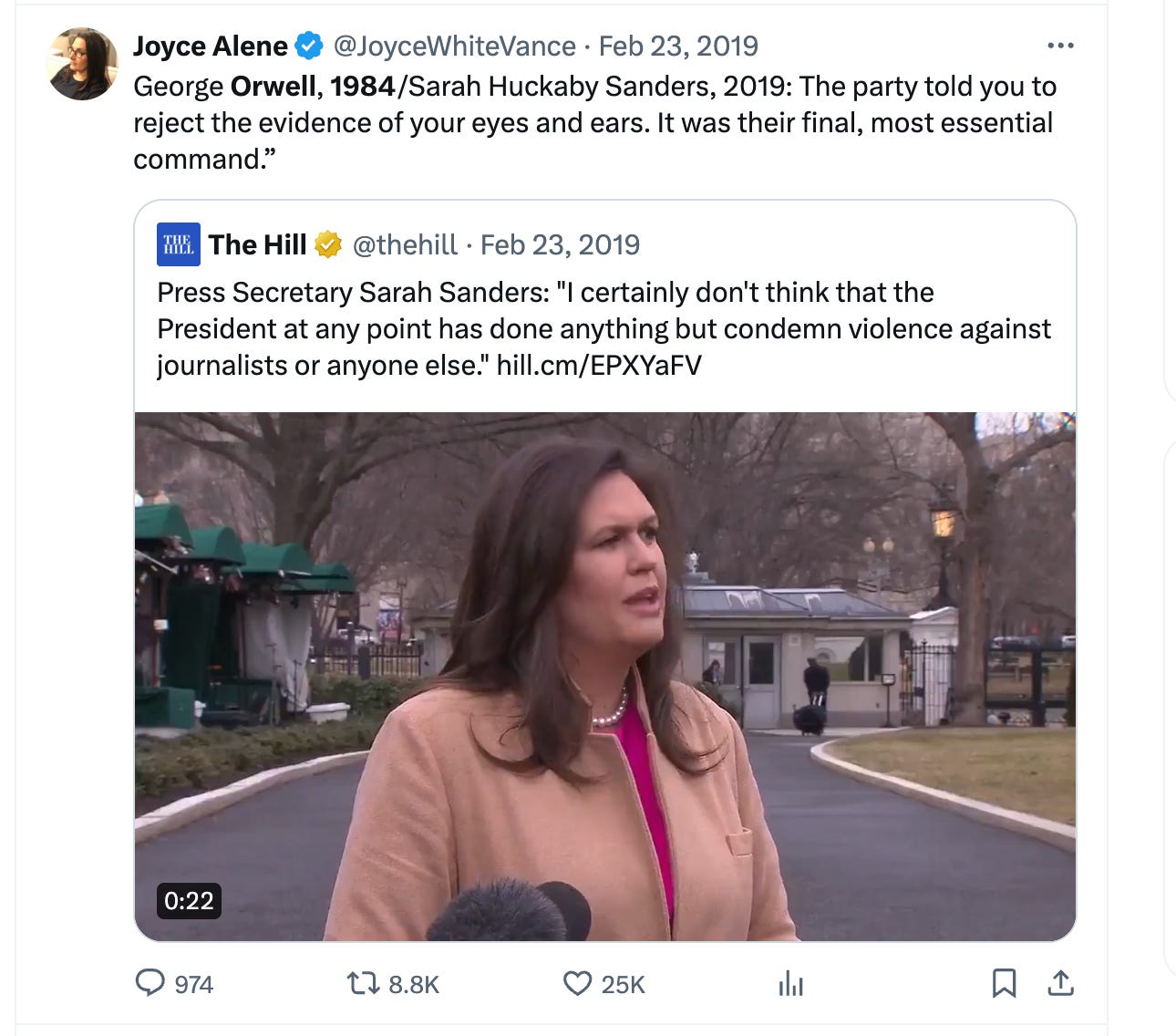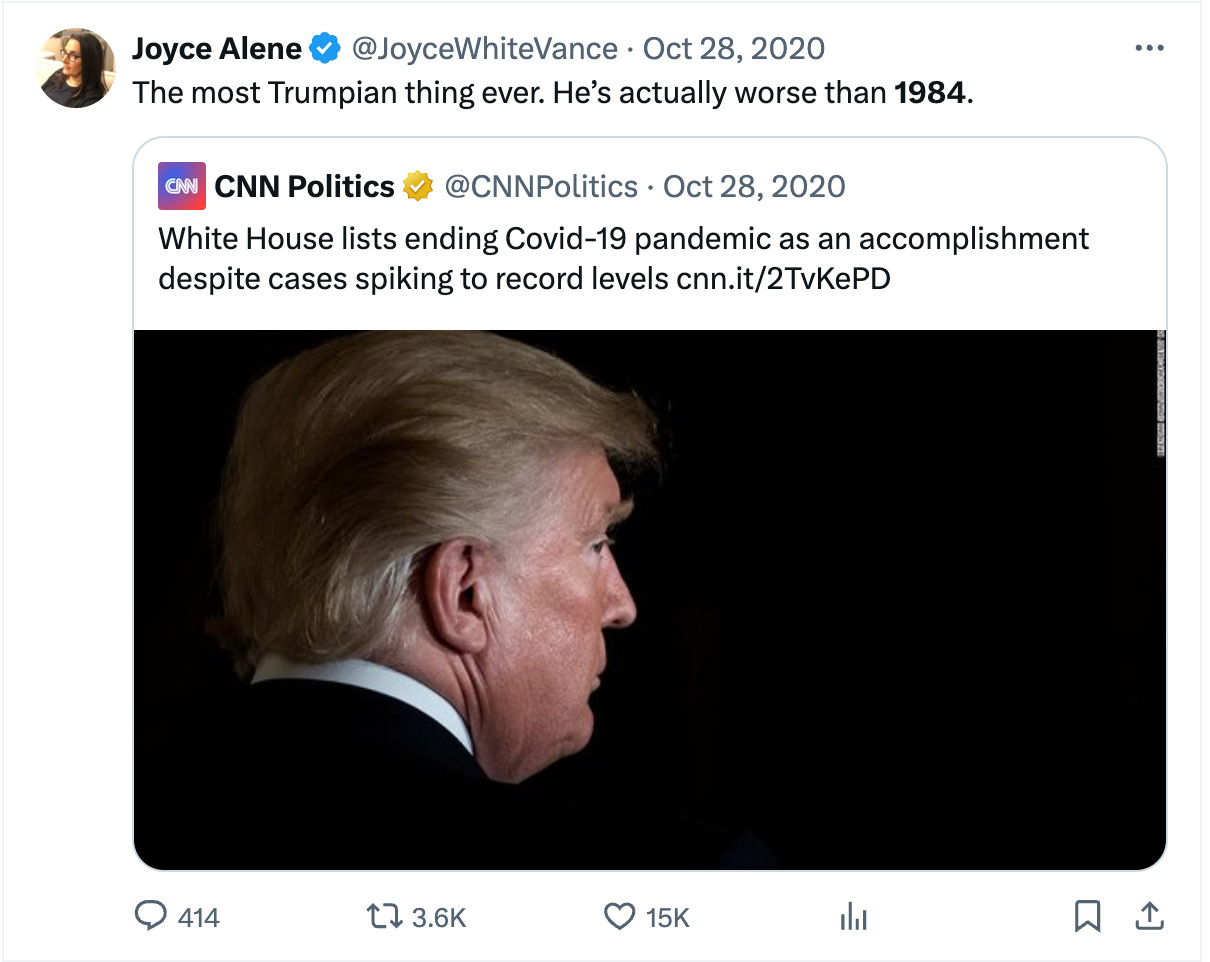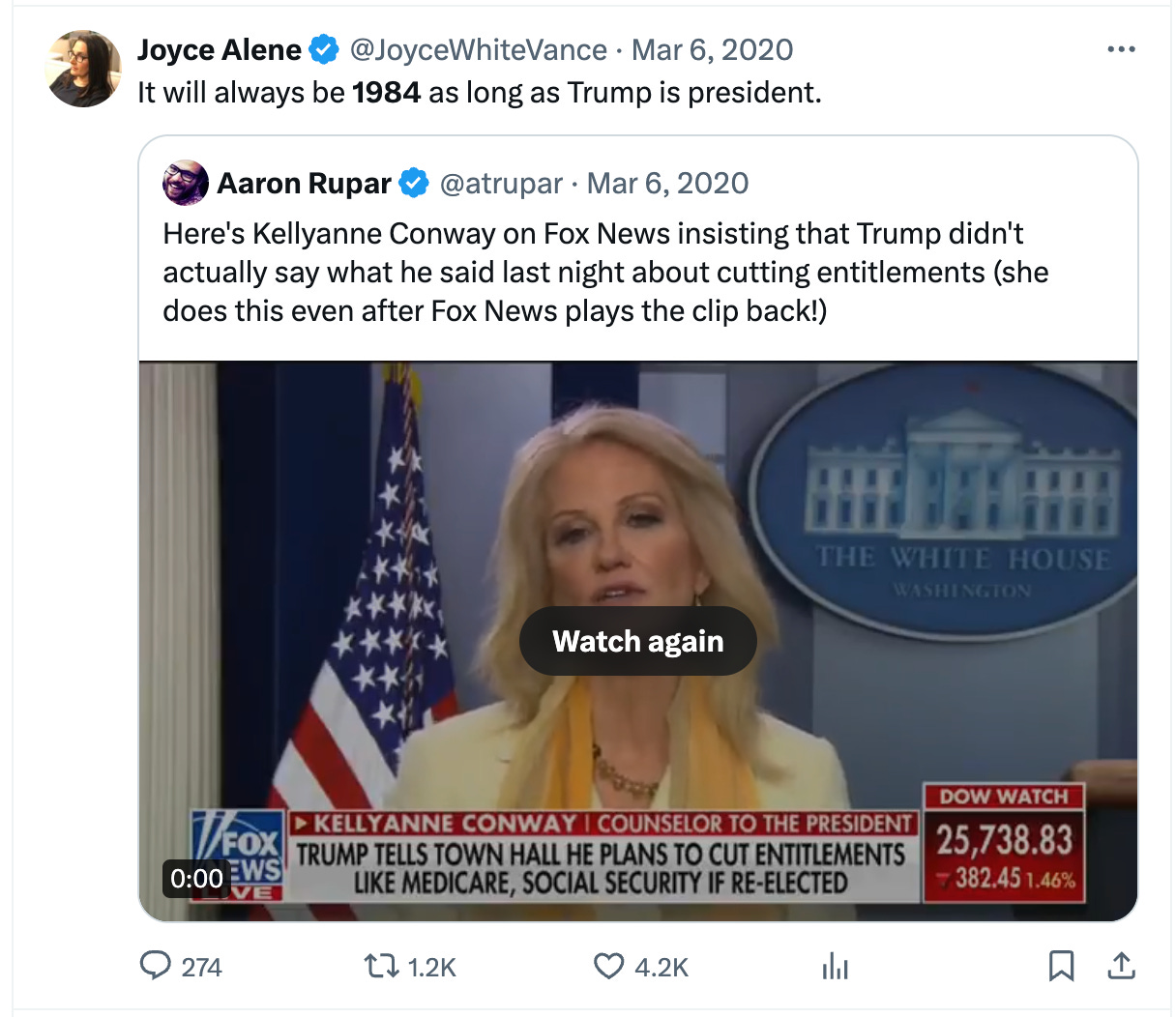By Joyce Vance
May 22, 2024
Source: Civil Discourse

In the first year of Trump’s presidency, I decided it was time to reread George Orwell’s classic “1984,” which I hadn’t touched for a couple of decades. When I read it again, it was upsetting to find it resonated in a way I never expected it to. “1984” was supposed to be an artifact from a future we had avoided. It turns out it was not.

It was newly relevant in obscene and dangerous ways.

The deception in order to influence public opinion was everywhere.

1984 became a cliche. It actually stopped being powerful, but its reality was so persuasive. We became a culture of alternative facts. We are still struggling to fight back. Progress is not linear.

Good fiction can be an escape, but we also live in a time when it is instructive. As much as Orwell’s writing was freshly eye-opening at the start of Trump’s presidency, Margaret Atwood’s “The Handmaid’s Tale” is appropriate for this moment. Many people have seen the popular dystopian TV show. But it’s the book itself, which I read in 1985 when it was first published, that I want to turn back to in this moment.
The book is a beautifully written dystopian novel set in what was then the near future, looking at a United States split into pieces and imagining life in “Gilead,” a Christian fundamentalist theocracy with strict class lines and second class citizenship, sometimes sexual slavery, for women. Undesirable people were sent to do hard labor in the radioactive “colonies.”
As Trump’s willingness to let Christian nationalist elements hold increasing sway over his policy decisions became apparent, people who pointed to “The Handmaid’s Tale” were dismissed as alarmist. But they were not. We live in an America where legal abortion is increasingly off the table while hunting down women who go out of state to access care is under discussion. Today, Trump refused to commit that people had a right to use contraception.
Today, in the most recent attack on American women in the wake of Dobbs, the Supreme Court case that reversed Roe v. Wade, the Louisiana GOP-controlled House of Representatives passed a new law. It adds the two drugs used for medication abortion to the state’s list of controlled dangerous substances, making possession of the drugs without a valid prescription a crime. The bill now goes to 28-11 Republican-controlled State Senate, where its passage is all be assured.
After that, the bill goes to the desk of Republican Governor Jeff Landry for signature. In 2022, as Attorney General, Landry threatened the medical licenses of doctors who continued to provide abortion care after a judge temporarily blocked the state’s abortion ban. In 2023, as Attorney General and then Governor-elect, he personally solicited the Louisiana State Bond Commission to withhold millions in funding necessary to prevent saltwater from intruding into New Orleans’ water supply because the city government refused to arrest and prosecute women after the state passed its abortion ban. In 2022, Landry said, “If you don’t like the laws of the state, you can move to one which you like.” But the following summer, he joined 17 other state attorneys general who signed a letter Mississippi Attorney General Lynn Fitch sent to the Biden administration demanding access to information about residents who obtain abortions or gender-affirming care in other states.
You get the point. Barring something completely unforeseen, this bill is about to become the law. Women and people who help them, including women who need an abortion to protect their lives or their fertility will be imprisoned under this state law if they choose to try and take control of their health.
Readers of Civil Discourse will recall that we’ve discussed repeatedly how safe these abortion drugs are. Mifepristone, the subject of lots of litigation, is safer than Tylenol or Viagra. And it’s effective. Perhaps that’s the problem. Letting women direct their own futures doesn’t work for the Handmaid’s Tale crowd. The Guttmacher Institute, a reliable source for tracking statistics and trends on abortion, says that 63% of abortions in this country, an increase of 10% from 2020, are now medication abortions.
This new law doesn’t represent the views of Louisiana voters. In a June 2023 poll, 52% of respondents said abortion should be legal in all or most cases. An overwhelming 85% said that a woman should be able to obtain a legal abortion if her life is seriously endangered due to pregnancy, and 77% said a woman should be able to obtain a legal abortion if she became pregnant as a result of rape. Laws that deny women this access to care are not a product of the will of the voters in Louisiana, and certainly not nationwide, where by March of 2024, 74% of Americans backed access to medication abortion.
The Handmaid’s Tale Halloween costumes are no longer ironically funny. Especially not with Trump on the ballot this year.
There is hope. Justice Department lawyers are undoubtedly scrutinizing this measure for constitutional defects and will prepare to launch one of the two basic kinds of challenges to a law like this if possible: either a facial challenge that says the law as written is unconstitutional or an “as applied” challenge that would take issue with its impact once it goes into effect. That’s how DOJ, during Democratic administrations, has successfully challenged some of the worst abuses of state legislatures in areas ranging from abortion to immigration to voting rights. Those challenges won’t happen if Donald Trump retakes the White House; his Attorney General will not authorize them. Right now, it’s more important than ever to retain as much in the way of checks and balances against encroaching Christian nationalism and “unified Reichs” as possible.
We’re in this together,
Joyce

In the first year of Trump’s presidency, I decided it was time to reread George Orwell’s classic “1984,” which I hadn’t touched for a couple of decades. When I read it again, it was upsetting to find it resonated in a way I never expected it to. “1984” was supposed to be an artifact from a future we had avoided. It turns out it was not.

It was newly relevant in obscene and dangerous ways.

The deception in order to influence public opinion was everywhere.

1984 became a cliche. It actually stopped being powerful, but its reality was so persuasive. We became a culture of alternative facts. We are still struggling to fight back. Progress is not linear.

Good fiction can be an escape, but we also live in a time when it is instructive. As much as Orwell’s writing was freshly eye-opening at the start of Trump’s presidency, Margaret Atwood’s “The Handmaid’s Tale” is appropriate for this moment. Many people have seen the popular dystopian TV show. But it’s the book itself, which I read in 1985 when it was first published, that I want to turn back to in this moment.
The book is a beautifully written dystopian novel set in what was then the near future, looking at a United States split into pieces and imagining life in “Gilead,” a Christian fundamentalist theocracy with strict class lines and second class citizenship, sometimes sexual slavery, for women. Undesirable people were sent to do hard labor in the radioactive “colonies.”
As Trump’s willingness to let Christian nationalist elements hold increasing sway over his policy decisions became apparent, people who pointed to “The Handmaid’s Tale” were dismissed as alarmist. But they were not. We live in an America where legal abortion is increasingly off the table while hunting down women who go out of state to access care is under discussion. Today, Trump refused to commit that people had a right to use contraception.
Today, in the most recent attack on American women in the wake of Dobbs, the Supreme Court case that reversed Roe v. Wade, the Louisiana GOP-controlled House of Representatives passed a new law. It adds the two drugs used for medication abortion to the state’s list of controlled dangerous substances, making possession of the drugs without a valid prescription a crime. The bill now goes to 28-11 Republican-controlled State Senate, where its passage is all be assured.
After that, the bill goes to the desk of Republican Governor Jeff Landry for signature. In 2022, as Attorney General, Landry threatened the medical licenses of doctors who continued to provide abortion care after a judge temporarily blocked the state’s abortion ban. In 2023, as Attorney General and then Governor-elect, he personally solicited the Louisiana State Bond Commission to withhold millions in funding necessary to prevent saltwater from intruding into New Orleans’ water supply because the city government refused to arrest and prosecute women after the state passed its abortion ban. In 2022, Landry said, “If you don’t like the laws of the state, you can move to one which you like.” But the following summer, he joined 17 other state attorneys general who signed a letter Mississippi Attorney General Lynn Fitch sent to the Biden administration demanding access to information about residents who obtain abortions or gender-affirming care in other states.
You get the point. Barring something completely unforeseen, this bill is about to become the law. Women and people who help them, including women who need an abortion to protect their lives or their fertility will be imprisoned under this state law if they choose to try and take control of their health.
Readers of Civil Discourse will recall that we’ve discussed repeatedly how safe these abortion drugs are. Mifepristone, the subject of lots of litigation, is safer than Tylenol or Viagra. And it’s effective. Perhaps that’s the problem. Letting women direct their own futures doesn’t work for the Handmaid’s Tale crowd. The Guttmacher Institute, a reliable source for tracking statistics and trends on abortion, says that 63% of abortions in this country, an increase of 10% from 2020, are now medication abortions.
This new law doesn’t represent the views of Louisiana voters. In a June 2023 poll, 52% of respondents said abortion should be legal in all or most cases. An overwhelming 85% said that a woman should be able to obtain a legal abortion if her life is seriously endangered due to pregnancy, and 77% said a woman should be able to obtain a legal abortion if she became pregnant as a result of rape. Laws that deny women this access to care are not a product of the will of the voters in Louisiana, and certainly not nationwide, where by March of 2024, 74% of Americans backed access to medication abortion.
The Handmaid’s Tale Halloween costumes are no longer ironically funny. Especially not with Trump on the ballot this year.
There is hope. Justice Department lawyers are undoubtedly scrutinizing this measure for constitutional defects and will prepare to launch one of the two basic kinds of challenges to a law like this if possible: either a facial challenge that says the law as written is unconstitutional or an “as applied” challenge that would take issue with its impact once it goes into effect. That’s how DOJ, during Democratic administrations, has successfully challenged some of the worst abuses of state legislatures in areas ranging from abortion to immigration to voting rights. Those challenges won’t happen if Donald Trump retakes the White House; his Attorney General will not authorize them. Right now, it’s more important than ever to retain as much in the way of checks and balances against encroaching Christian nationalism and “unified Reichs” as possible.
We’re in this together,
Joyce
No comments:
Post a Comment